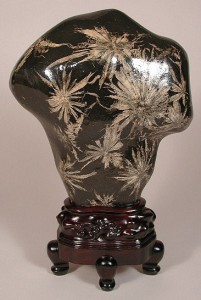 Place of origin:
Place of origin:
Liuyang County, Hunan Province; Enshi County, Hubei Province; Yongfeng County, Jiangxi Province
Mineral composition:
Limestone; cinerea (ash-colored) limestone
Unique and highly prized among stone collectors, chrysanthemum stones appear to be white flowers embedded in black rock; exhibiting such details as petals and stamen, they look so vivid that many people mistake them for fossilized flowers. In his Elegant Stones (Ya Shi), the contemporary scholar Zhang Hongzhao explains their formation:
“When calcites in the chrysanthemum stone integrate, the stone materials will condense and then solidify toward the center, forming big or small patterns in shapes resembling those of chrysanthemums.”
Although the flowers are naturally formed, only through polishing do they become prominent. In 1915, a chrysanthemum stone hanging screen made in Liuyang won the Gold Award at the International Fair in Panama, which has made this stone type widely popular ever since.
Chrysanthemum stones from different places show slight variations in the shapes of their flowers. The flowers of Liuyang chrysanthemum stones are small but evenly arranged. The chrysanthemum scholars’ rocks and chrysanthemum inkstones available today are all made of Liuyang chrysanthemum stones, although there are inevitably some exceptions. The flowers of chrysanthemum stones from Enshi are large and of different sizes. As well, there is a clearer distinction between the base stone and the bright, pure white flowers. The flowers of chrysanthemum stones from Yongfeng also vary, not only in size but in the patterns of their flowers, and look more like painted pictures. Some of the Yongfeng stones have slight yellow or red color in them.
Since chrysanthemum stones are mountain stones (although some are found in water), some polishing is done to make their colors more distinct. However, the flowers should not be carved into relief (as is sometimes done) and the contact area between the flowers and the stone should be retained so as to emphasize the natural evolution of such stones. Misguided human effort to highlight the flower patterns can lead to unfortunate aesthetic results.